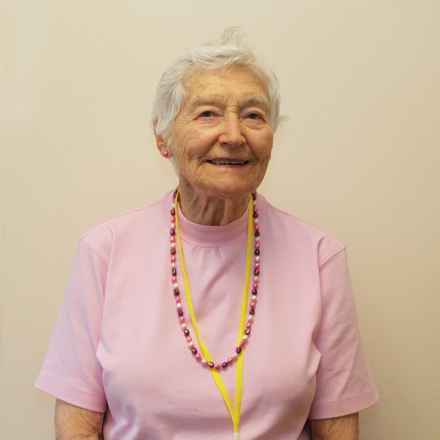'Without the befriending service, it would be very depressing for so many people'
Posted: Friday 11 February 2022
A 98-year-old volunteer who was left feeling depressed and hopeless after her diagnosis of age-related macular degeneration (AMD) has praised the Macular Society's befriending service for being a 'tremendous help' to her and others.
Since losing her sight in her second eye to AMD 13 years ago, Barbara Hogg has been volunteering for the Macular Society to help others who are devastated by their diagnosis.
At the time of her diagnosis there was no treatment available and after a consultation at Moorfields Eye Hospital she said it was “all doom and gloom”, until she discovered the Macular Society.
“I was feeling so very depressed,” said Barbara. “I had no relatives to look after me and I was living alone in my own home. It got to a stage where I wasn’t ashamed to say I had suicidal thoughts. I simply couldn’t see a way forward.
"But I went to a national conference held by the Macular Society and they were asking for volunteers. I felt I could do that having spoken to students much of my professional life.”
Barbara continues to be a one of our fantastic befrienders as well as a Skills for Seeing trainer – teaching people to make best use of their remaining peripheral vision.
Our befriending volunteers provide regular, friendly phone calls to people living with macular disease. The service is designed to rebuild confidence and independence and aims to match befrienders and befriendees who share similar interests or experiences.
Barbara said: “It was some years ago I became a befriender and I still speak to one lady who was the first person I was paired with. She lives alone and I try to help her as best I can.
“If it didn’t exist it would be very depressing for so many people. I know consultants are interested more in the physical side of macular disease but not enough thought goes into the emotional and physiological stress that macular disease causes people.
"I like to listen to them about their experiences, but some people want to chat more than others. You start off talking, inevitably, about your health problems but we talk about all kinds of things, not just about our eyes.
“I’ve been told it has been a tremendous help for the confidence of one of my befriendees. I know it’s made such a difference to their life and I’m someone they can hold on to, someone to speak to when they are at their lowest. People are very thankful and I think for people suffering they have some safety, there’s someone they can talk to. It’s such a useful service."
At 98, Barbara doesn't have any plans to step away from the role anytime soon. She said: "My brain feels younger than my body and it must be active and involved."
If you would like to become a volunteer, or to be matched with a befriender, visit our Befriending page or call us on 0300 3030 111 to find out more about the service.
